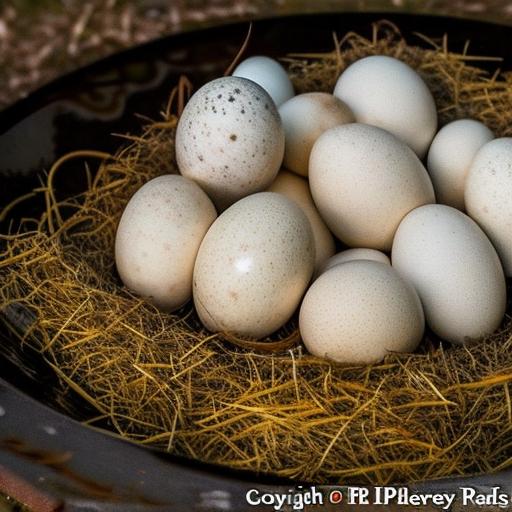Toulouse geese, also known as Grey Toulouse geese, are a breed of domestic geese that originated in France. They are named after the city of Toulouse, where they were first bred in the 16th century. These geese were primarily raised for their meat and feathers, and they quickly gained popularity due to their large size and excellent meat quality.
Breeding Toulouse geese can be a rewarding endeavor for both hobbyists and commercial farmers. These geese are known for their calm and docile temperament, making them easy to handle and care for. Additionally, they have a good egg-laying ability, with females typically laying around 20-40 eggs per year. This makes them a versatile breed that can be raised for both meat and egg production.
Key Takeaways
- Toulouse geese are a popular breed for meat and egg production, as well as for exhibition purposes.
- They are known for their large size, calm temperament, and distinctive blue-grey plumage.
- When selecting breeding stock, it is important to consider traits such as size, conformation, and feather quality.
- Breeding season typically begins in late winter or early spring, and eggs should be incubated for around 28-30 days.
- Goslings should be kept warm and dry, and fed a balanced diet to promote healthy growth. Regular health checks and disease prevention measures are also important for maintaining a successful breeding operation.
Characteristics of Toulouse Geese
Toulouse geese are large birds with a distinctive appearance. They have a plump body, broad chest, and a long, thick neck. Their feathers are typically grey in color, with some variations ranging from light grey to dark grey. The bill and legs of Toulouse geese are orange or pinkish in color.
In terms of temperament, Toulouse geese are known for being calm and friendly. They are not aggressive birds and can be easily handled and trained. This makes them suitable for families with children or individuals who want a peaceful and low-maintenance bird.
When it comes to egg-laying ability, Toulouse geese are considered good layers. The females typically start laying eggs at around 2-3 years of age and can lay up to 40 eggs per year. The eggs are large in size and have a creamy white color. However, it is important to note that Toulouse geese are not as prolific layers as some other breeds, such as the Embden or Chinese geese.
Selecting Breeding Stock for Toulouse Geese
When selecting breeding stock for Toulouse geese, there are several traits to look for. Firstly, it is important to choose birds that conform to the breed standard in terms of size, color, and overall appearance. This ensures that the offspring will have the desired characteristics of the breed.
In addition to physical traits, it is also important to consider the temperament of the birds. Look for geese that are calm, friendly, and easy to handle. This will make breeding and handling the birds much easier and more enjoyable.
Finding quality breeding stock can be done through various sources. One option is to attend poultry shows or exhibitions where breeders showcase their birds. This allows you to see the birds in person and assess their quality before making a purchase. Another option is to contact reputable breeders directly and inquire about available stock. They can provide you with information about their breeding program and the quality of their birds.
Breeding Season for Toulouse Geese
Toulouse geese typically breed in the spring, starting around March or April. This is when the days start getting longer and the weather begins to warm up. Breeding during this time ensures that the goslings will hatch in favorable conditions and have enough time to grow before winter.
To encourage breeding, it is important to provide a suitable environment for the geese. This includes providing them with a spacious and secure enclosure where they can mate and nest. It is also important to ensure that they have access to clean water for swimming, as this is an important part of their courtship behavior.
Nesting and Incubation of Toulouse Geese Eggs
Toulouse geese are known for their strong maternal instincts and are generally good at nesting and incubating their eggs. However, it is still important to provide them with a suitable nesting environment to ensure successful hatching.
Create a nesting area by providing a secluded and comfortable spot for the geese to lay their eggs. This can be a simple nest made of straw or hay, or you can provide nesting boxes for them to use. Make sure the nesting area is clean and free from any potential hazards.
The incubation period for Toulouse geese eggs is approximately 28-34 days. During this time, it is important to maintain a consistent temperature and humidity level in the incubator. The ideal temperature for incubating Toulouse geese eggs is around 99-100 degrees Fahrenheit (37-38 degrees Celsius). It is also important to regularly turn the eggs to ensure proper development.
Raising Toulouse Goslings

Once the goslings hatch, it is important to provide them with proper care and nutrition to ensure their healthy growth. Keep them in a warm and secure brooder area with access to clean water and appropriate feed.
Toulouse goslings are relatively hardy and do not require extensive care. However, it is important to monitor their health and address any issues promptly. Common health issues in goslings include respiratory infections, leg problems, and nutritional deficiencies. To prevent these issues, provide a clean and well-ventilated environment, ensure they have access to proper nutrition, and monitor their growth and behavior closely.
Feeding and Nutrition for Toulouse Geese
Proper feeding and nutrition are essential for the health and growth of Toulouse geese. They require a balanced diet that includes a combination of grains, greens, and protein sources.
For adult Toulouse geese, a diet consisting of a commercial waterfowl pellet or grain mix supplemented with fresh greens is usually sufficient. It is important to provide them with access to clean water at all times, as geese require water for digestion and to keep their bills clean.
During the breeding season, it is important to provide additional nutrients to support egg production. This can be done by offering a higher protein feed or supplementing their diet with sources of animal protein, such as mealworms or fish meal.
Health and Disease Management for Toulouse Geese
Toulouse geese are generally hardy birds, but they can still be susceptible to certain health issues. Common health issues in geese include respiratory infections, parasites, and nutritional deficiencies.
To prevent these issues, it is important to provide a clean and well-maintained environment for the geese. Regularly clean their enclosure and provide fresh bedding to prevent the buildup of bacteria and parasites. Additionally, ensure that they have access to clean water and a balanced diet to meet their nutritional needs.
If you notice any signs of illness in your Toulouse geese, such as coughing, sneezing, or changes in behavior, it is important to consult a veterinarian who specializes in poultry health. They can provide a proper diagnosis and recommend appropriate treatment options.
Marketing Toulouse Geese and their Products
Breeding Toulouse geese can also be a profitable venture if you choose to sell live birds, eggs, or meat. There is a demand for Toulouse geese in the market due to their large size and excellent meat quality.
Selling live birds can be done through various channels, such as local farmers’ markets, poultry shows, or online platforms. It is important to market your birds as purebred Toulouse geese and highlight their desirable characteristics, such as their size and temperament.
In addition to live birds, you can also sell Toulouse goose eggs for hatching or consumption. These eggs are larger than chicken eggs and have a rich flavor. Selling goose meat can also be a lucrative option, as Toulouse geese are known for their tender and flavorful meat.
Pros and Cons of Breeding Toulouse Geese
Breeding Toulouse geese can be a rewarding endeavor for both hobbyists and commercial farmers. These geese have a calm temperament, good egg-laying ability, and excellent meat quality. They are also relatively easy to care for and can be a valuable addition to any poultry operation.
However, there are also potential challenges and drawbacks to consider. Toulouse geese require a significant amount of space and can be messy, so proper housing and management are essential. Additionally, they may not be as prolific layers as some other breeds, so if egg production is a priority, other breeds may be more suitable.
Overall, breeding Toulouse geese can be a fulfilling and profitable venture for those who are willing to invest the time and resources into their care. With proper management and attention to their needs, these geese can thrive and provide a valuable source of meat, eggs, or live birds.
If you’re interested in breeding Toulouse geese, you may also find this article on Poultry Wizard helpful. It provides valuable insights and tips on raising and caring for chickens in a chicken coop. From the importance of a well-designed coop to creating a cozy and functional interior, this article covers it all. Check it out here: https://poultrywizard.com/keeping-chickens/chicken-coop-interior-ideas/.
FAQs
What are Toulouse geese?
Toulouse geese are a breed of domestic geese that originated in France. They are known for their large size, calm temperament, and distinctive gray-blue plumage.
What is breeding Toulouse geese?
Breeding Toulouse geese involves selecting healthy, genetically diverse birds and pairing them to produce offspring with desirable traits. This can include traits such as size, feather color, and temperament.
What is the breeding season for Toulouse geese?
The breeding season for Toulouse geese typically begins in late winter or early spring, when the birds reach sexual maturity. Breeding pairs will mate and lay eggs throughout the season, which can last several months.
How many eggs do Toulouse geese lay?
Toulouse geese typically lay between 20 and 40 eggs per breeding season, with each egg taking around 28-30 days to hatch. However, the number of eggs can vary depending on factors such as the age and health of the birds.
What is the incubation period for Toulouse geese?
The incubation period for Toulouse geese is around 28-30 days. During this time, the eggs must be kept at a consistent temperature and humidity level to ensure proper development.
What are some common health issues in Toulouse geese?
Common health issues in Toulouse geese include respiratory infections, parasites, and foot problems. It is important to provide proper nutrition, housing, and veterinary care to prevent and treat these issues.
What are some tips for breeding Toulouse geese?
Some tips for breeding Toulouse geese include selecting healthy, genetically diverse birds, providing proper nutrition and housing, and monitoring the birds for signs of illness or injury. It is also important to have a plan for caring for the offspring once they hatch.
Meet Walter, the feathered-friend fanatic of Florida! Nestled in the sunshine state, Walter struts through life with his feathered companions, clucking his way to happiness. With a coop that’s fancier than a five-star hotel, he’s the Don Juan of the chicken world. When he’s not teaching his hens to do the cha-cha, you’ll find him in a heated debate with his prized rooster, Sir Clucks-a-Lot. Walter’s poultry passion is no yolk; he’s the sunny-side-up guy you never knew you needed in your flock of friends!







